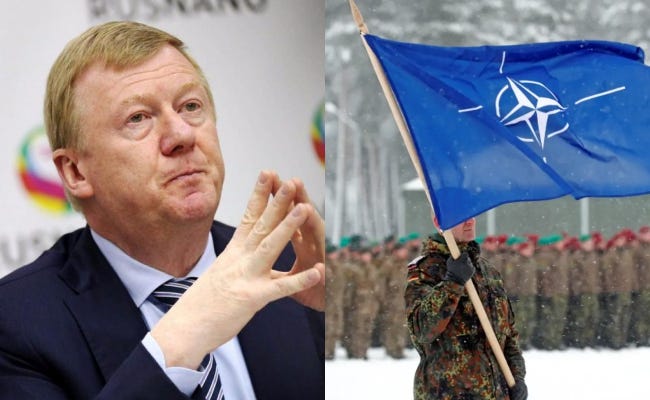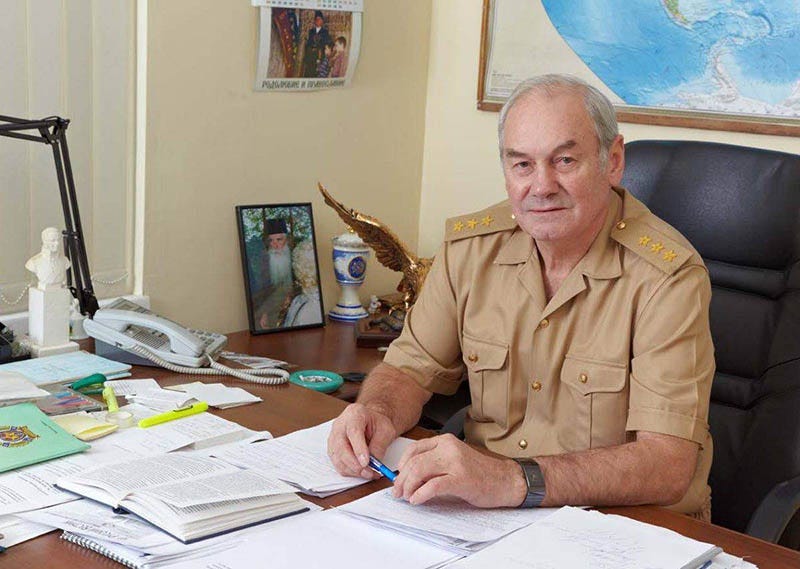Who (or what) is the biggest threat to Russia?
A Russian general argues internal enemies are more dangerous than NATO

Important: We just published a story about Russian truckers organizing their own Canada-inspired Freedom Convoy—but we goofed up and didn’t send it to all of our subscribers. So most of you did not receive this newsletter. For those who missed it:
We’ll keep a close eye on this story and report on any developments.
Okay, moving on: Who (or what) is the biggest threat to Russia?
Probably a lot of people would immediately answer: NATO. Which is both understandable and completely reasonable. NATO’s obscene and reckless eastward expansion—not to mention its penchant for bombing random people for no reason whatsoever—makes this “defensive” alliance a clear external threat to Russia.
And as NATO creeps closer to Russia—and cozies up to Ukraine—this threat has become more pronounced. It’s possible Moscow may even respond militarily.
But is this threat existential? Is it critical? Does NATO actually represent the biggest threat to Russia? According to retired Colonel-General Leonid Ivashov: No.
Ivashov believes “strategic stability” has been maintained and that the greatest threat to Russia is actually “internal in nature.” By the way: the colonel-general is not some creepy defector who relocated to the suburbs of Langley; he’s the chairman of the All-Russian Officers’ Assembly and writes for Zvezda, a state-owned outlet run by the Russian Ministry of Defense. (Hat tip to the valued reader who forwarded us Ivashov’s remarks.)
Still, this is very provocative! Are career scam-artists such as Anatoly Chubais or Herman Gref more dangerous than NATO?
We think Ivashov’s analysis has merit; at the very least, it’s a spicy take that’s worthy of discussion. (Perhaps unsurprisingly, his comments were picked up by western media. This is sort of inevitable. It happens every time any semi-important Russian is critical of Russian foreign policy.)
That being said, this is not an endorsement! Just to be very clear. First of all, we think Ivashov downplays the clearly aggressive and unwarranted posturing by NATO. He also assumes that any military action by Russia would trigger a large-scale response by NATO; we disagree.
But he also asks some uncomfortable questions: what would be gained from a military conflict—even a small-scale operation? Would the perceived security benefits outweigh the inevitable long-term sanctions and other consequences that may not even be military in nature? How would the average Russian benefit? Obviously, these are not easy questions to answer.
Below are some excerpts from Ivashov’s thought-provoking statement:
Today humanity lives in anticipation of war. And war is the inevitable loss of life, destruction, suffering of large masses of people, the destruction of the usual way of life, the violation of the vital systems of states and peoples. A big war is a huge tragedy, someone’s serious crime. It so happened that Russia was at the center of this impending catastrophe. And, perhaps, this is the first time in its history.
Previously, Russia (USSR) waged forced (just) wars, and, as a rule, when there was no other way out, when the vital interests of the state and society were threatened.
And what threatens the existence of Russia itself today, and are there such threats? It can be argued that there is indeed a threat—the country is on the verge of completing its history. All vital areas, including demography, are steadily degrading, and the rate of population extinction is breaking world records. And degradation is systemic in nature, and in any complex system, the destruction of one of the elements can lead to the collapse of the entire system.
And this, in our opinion, is the main threat to the Russian Federation. But this is a threat of an internal nature, emanating from the model of the state, the quality of power and the state of society. And the reasons for its formation are internal: the unviability of the state model, the complete incapacity and lack of professionalism of the system of power and administration, the passivity and disorganization of society. In this state, any country does not live long.
As for external threats, they are certainly present. But, according to our expert assessment, they are not currently critical, directly threatening the existence of Russian statehood, its vital interests. On the whole, strategic stability is maintained, nuclear weapons are under reliable control, NATO forces are not building up, and they are not showing threatening activity.
Therefore, the situation that is being whipped up around Ukraine is, first of all, artificial, mercenary in nature for some internal forces, including the Russian Federation. As a result of the collapse of the USSR, in which Russia (Yeltsin) took a decisive part, Ukraine became an independent state, a member of the UN, and in accordance with Art. 51 of the UN Charter has the right to individual and collective defense.
The leadership of the Russian Federation has not yet recognized the results of the referendum on the independence of the DPR and LPR, while at the official level more than once, including during the Minsk negotiation process, emphasized the belonging of their territories and population to Ukraine.
It has also been said more than once at a high level about the desire to maintain normal relations with Kiev, without singling out special relations with the DPR and LPR.
The issue of the genocide perpetrated by Kiev in the southeastern regions was not raised either in the UN or in the OSCE. […]
The use of military force against Ukraine, firstly, will call into question the existence of Russia itself as a state; secondly, it will forever make Russians and Ukrainians mortal enemies. Thirdly, there will be thousands (tens of thousands) of dead young, healthy guys on one side and on the other, which will certainly affect the future demographic situation in our dying countries. On the battlefield, if this happens, Russian troops will face not only Ukrainian military personnel, among whom there will be many Russian guys, but also military personnel and equipment from many NATO countries, and the member states of the alliance will be obliged to declare war on Russia.
President of the Republic of Turkey R. Erdogan clearly stated which side Turkey would fight on. And it can be assumed that two Turkish field armies and a fleet will be ordered to “liberate” Crimea and Sevastopol and possibly invade the Caucasus.
In addition, Russia will definitely be included in the category of countries that threaten peace and international security, will be subject to the heaviest sanctions, will turn into a pariah of the world community, and will probably be deprived of the status of an independent state.
The president and the government, the Ministry of Defense cannot fail to understand such consequences, they are not so stupid.
The question arises: what are the true goals of provoking tension on the brink of war, and the possible unleashing of large-scale hostilities? […]
In our opinion, the country's leadership, realizing that it is not capable of leading the country out of the systemic crisis, and this can lead to an uprising of the people and a change of power in the country, with the support of the oligarchy, corrupt officials, lured media and security forces, decided to activate the political line for the final destruction Russian statehood and the extermination of the indigenous population of the country.
And war is the means that will solve this problem in order to retain its anti-national power for a while and preserve the wealth stolen from the people. We cannot suggest any other explanation.
He then called on Putin to… resign.
UPDATE: Just for more context, Ivashov is a long-time Putin critic who has been demanding his resignation for many years. An interesting Twitter thread on this.
Discuss!






Talk about false narrative. Current hysteria about 'invasion' is nothing more than a product of internal politics in the US and UK and a projection, gladly amplified by some of the Putin's internal opposition (like this general who has his personal grievances against Putin, and who isn't in any way objective reader of the events). Russia remains Ukraine's #1 economic partner; why would it spend money on fighting when it makes good money by trading? The whole idea of a war goes against international law, against Russian military doctrine, and against Putin's personal philosophy and practices. For the last 7 years, all the "intervention" Putin could offer to Donbass was Russian passports and "Minsk agreements" - something Donbass doesn't even want. So, maximum what RF might be willing to do at this point is to recognize the 2 Donbass republics' independence (thus creating a buffer zone between Russia and Ukraine - and even that will be done only if Russia gets pushed against the wall by some particularly ungodly provocation from the other side...).
The liberal scam-hipsters managed to co-exist with the hardcore old-school goons, but that might be changing! Putin has already created numerous security agencies so they all have competing interests and can't gang up on him, but he won't be able to pull of an Erdogan post-2016 coup attempt military cleansing.
Will have to see if others speak up too, especially on Zvezda.